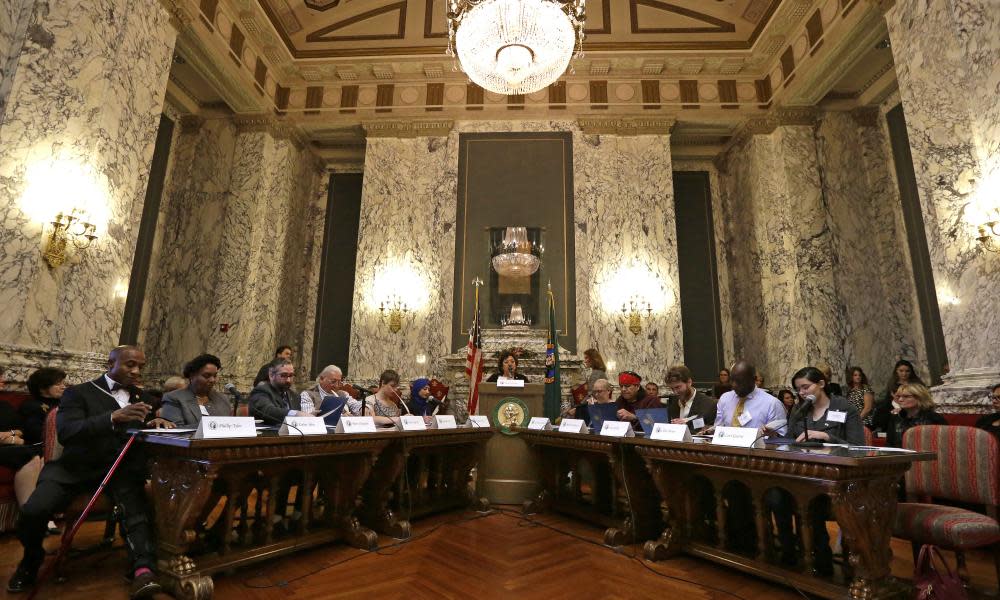Faithless electors: US supreme court to weigh role of electoral college members

On Wednesday morning, Bret Chiafolo will have the surreal experience of listening to a live broadcast from the quarantined US supreme court as it debates whether his behavior during the 2016 presidential election was in breach of the constitution.
Chiafolo was one of seven so-called “faithless” electors who made national headlines four years ago as they made a long-shot attempt to stop Donald Trump ascending to the US presidency. In the process, they raised fundamental questions about the workings of America’s arcane system for choosing the occupant of the White House.
Unlike direct democracies, US presidents are not elected by the popular vote of the American people. Instead, they are selected by 538 members of the electoral college – electors as they are known – who are in turn selected by political parties in each state.
That anomaly led to the victory of Trump by 306 electoral votes to 232 for Clinton, even though she attracted the support of almost 3 million more Americans in the popular vote.
Chiafolo, a Microsoft employee who lives outside Seattle, was one of the 538 members of the electoral college who in 2016 would technically decide the outcome of one of the most heated and ugly races in US history. Under normal circumstances, his vote would be a foregone conclusion – he would merely cast his ballot for the presidential candidate who had won his state of Washington, in this case Clinton.
But Chiafolo had other ideas. He thought it more important to follow his own conscience and make a stand against Trump than to act like a “robotic automaton”, as he puts it, in following party lines.
“I had committed to put country before party – I believed it was my constitutional duty as an elector to oppose Donald Trump,” he told the Guardian in an interview this week.
Despite being a Democratic elector himself, he decided to vote for a moderate Republican, Colin Powell, in the hope that it would inspire other Republican electors in different states that Trump had won to withhold their vote from the president-elect. He was found in violation of state law and fined $1,000.
The case was brought to court and rose to the supreme court of Washington state, which upheld the fine. Chiafolo appealed to the US supreme court which will begin oral arguments on his case at 10am ET on Wednesday.
Later the same day a similar case from Colorado will be deliberated.
At the center of the proceedings is the question, does the US constitution invest the 538 electoral college members with individual will or are they just cogs in the country’s peculiar form of democracy? Chiafolo argues firmly he had the right to choose as he pleased – as implied by the word “elector” – and it was his constitutional duty to exercise that discretion.
He points to Alexander Hamilton’s Federalist Paper number 68, which specifically empowers electors to guard against presidential candidates ill-equipped to lead the nation. Hamilton expressly singled out candidates who lack “requisite qualifications”, display “talents for low intrigue, and the little arts of popularity” or who are susceptible to “the desire in foreign powers to gain an improper ascendant in our councils”.
In counter-arguments, lawyers for Washington state have warned that if the supreme court allows electoral college members to vote according to their individual consciences it would have “bizarre and dangerous consequences”. It would give the 538 electors more power than the millions of American voters, and “profoundly undermine public confidence in the value of participating in our democracy”.
Chiafolo said Wednesday’s oral arguments would help to answer a question that should have been settled 200 years ago: “Do electors have the freedom of voters or are they simply robotic automatons. Personally, I think it was always clear that it was always intended that there should be individual choice.”
He said he expects it to be an uphill battle attempting to convince the nation’s highest court. “The supreme court has been increasingly politicized over the years and that might affect the judgment,” he said.
Representing Chiafolo and another “faithless” elector in the Colorado case will be Lawrence Lessig, a constitutional law professor at Harvard. He said the supreme court’s decision was crucial at a time when the country was heading into another hotly contested presidential election.
“This case is especially important in the context of this election, as we maintain that there should be a human check or safety valve in the process of selecting the president,” Lessig told the Guardian.

